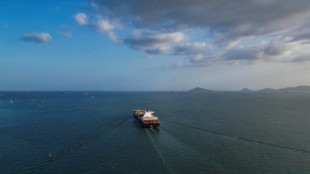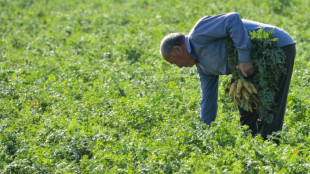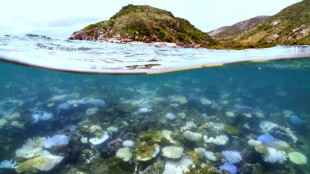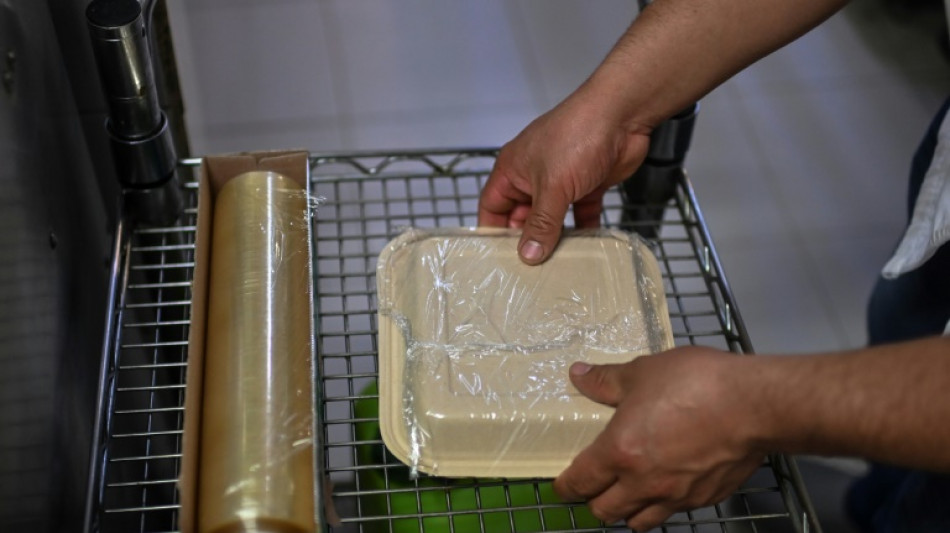
-
 The scientist rewriting DNA, and the future of medicine
The scientist rewriting DNA, and the future of medicine
-
'Anxious': US farmers see tariffs threaten earnings
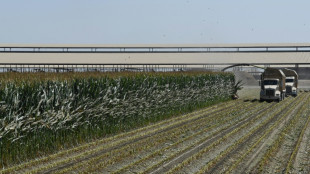
-
 Nostalgia fuels UK boom in vintage video game repairs
Nostalgia fuels UK boom in vintage video game repairs
-
Snappy birthday: Germany's Leica camera turns 100

-
 Bucks clinch playoff berth as West battle tightens
Bucks clinch playoff berth as West battle tightens
-
Czech beer culture eyes UNESCO listing as pubs take hit
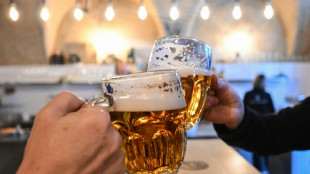
-
 Explosions as Kyiv under missile attack, says mayor
Explosions as Kyiv under missile attack, says mayor
-
Weary Boutier still alive in LPGA Match Play after 45-hole day

-
 Artificial glaciers boost water supply in northern Pakistan
Artificial glaciers boost water supply in northern Pakistan
-
Brooksby upsets Paul to reach Houston final

-
 Thomas, Bednarek hit jackpot at Grand Slam Track meet
Thomas, Bednarek hit jackpot at Grand Slam Track meet
-
Rodman on target as USA beat Brazil in Olympic rematch

-
 'Hands Off!' Anti-Trump Americans flood Washington
'Hands Off!' Anti-Trump Americans flood Washington
-
Harman leads by three at Texas Open

-
 Barcelona draw to increase Liga lead after Real Madrid stumble
Barcelona draw to increase Liga lead after Real Madrid stumble
-
Ecuador mounts anti-drug op overseen by Blackwater founder

-
 Pegula rallies to reach Charleston final
Pegula rallies to reach Charleston final
-
Nick Rockett flies to victory in magical Mullins Grand National

-
 Ovechkin on the brink of the 'impossible'
Ovechkin on the brink of the 'impossible'
-
Anthony, Bird to enter basketball Hall of Fame

-
 'Phenomenal' Munster edge O'Gara's La Rochelle to reach Champions Cup quarters
'Phenomenal' Munster edge O'Gara's La Rochelle to reach Champions Cup quarters
-
Munster edge O'Gara's La Rochelle to reach Champions Cup quarters

-
 Rahul, Jaiswal fire as Delhi and Rajasthan register big IPL wins
Rahul, Jaiswal fire as Delhi and Rajasthan register big IPL wins
-
Aston Villa beat Forest for seventh straight win ahead of PSG trip

-
 Jaiswal, Archer help Rajasthan thrash Punjab in IPL
Jaiswal, Archer help Rajasthan thrash Punjab in IPL
-
Inter's title charge stalls after throwing away points at Parma

-
 Real Madrid stumble at home to Valencia in Liga
Real Madrid stumble at home to Valencia in Liga
-
Leading garment producer Bangladesh holds crisis talks on US tariffs
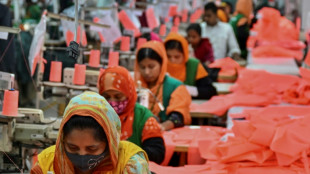
-
 PSG win 13th French title ahead of Aston Villa Champions League clash
PSG win 13th French title ahead of Aston Villa Champions League clash
-
Nick Rockett storms to victory in the 'Mullins' Grand National

-
 Despair and sadness follow death of Malian musical great Amadou
Despair and sadness follow death of Malian musical great Amadou
-
Arsenal held by Everton, Wolves push Ipswich closer to relegation

-
 Lions contender Prendergast fires Leinster to Champions Cup quarters
Lions contender Prendergast fires Leinster to Champions Cup quarters
-
Nick Rockett wins the 'Mullins' Grand National for father and son

-
 Last-gasp Buendia goal keeps Leverkusen's Bundesliga title hopes alive
Last-gasp Buendia goal keeps Leverkusen's Bundesliga title hopes alive
-
Video shows last minutes before Gaza aid workers' deaths, Red Crescent says

-
 Zverev 'mentally' affected by Australian Open defeat
Zverev 'mentally' affected by Australian Open defeat
-
Rahul guides Delhi to third straight IPL victory

-
 Arsenal draw at Everton to edge Liverpool closer to Premier League title
Arsenal draw at Everton to edge Liverpool closer to Premier League title
-
Senate Republicans move forward with Trump tax cuts

-
 Sinner regrets 'unfair' doping ban as he prepares return to courts
Sinner regrets 'unfair' doping ban as he prepares return to courts
-
Isa hat-trick powers Toulon into Champions Cup quarters in Saracens thriller

-
 'Hang tough, it won't be easy': Trump defiant on tariffs
'Hang tough, it won't be easy': Trump defiant on tariffs
-
Zelensky slams 'weak' US reply to Russian strike on his hometown

-
 Musiala hamstring tear compounds Bayern's injury crisis
Musiala hamstring tear compounds Bayern's injury crisis
-
Selfies, goals and cheers at South Africa's grannies World Cup

-
 Tsunoda frustrated with 15th in Red Bull qualifying debut
Tsunoda frustrated with 15th in Red Bull qualifying debut
-
Rain forecast adds new element to combustible Japanese GP
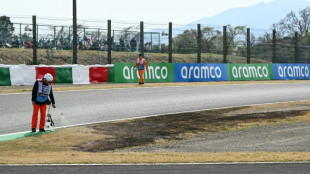
-
 Ukraine mourns 18 killed in Russian missile strike
Ukraine mourns 18 killed in Russian missile strike
-
Germany's Mueller to leave Bayern Munich after 25 years

| CMSC | 0.13% | 22.29 | $ | |
| SCS | -0.56% | 10.68 | $ | |
| RIO | -6.88% | 54.67 | $ | |
| JRI | -7.19% | 11.96 | $ | |
| BCC | 0.85% | 95.44 | $ | |
| BCE | 0.22% | 22.71 | $ | |
| BTI | -5.17% | 39.86 | $ | |
| CMSD | 0.7% | 22.83 | $ | |
| RBGPF | 100% | 69.02 | $ | |
| BP | -10.43% | 28.38 | $ | |
| NGG | -5.25% | 65.93 | $ | |
| VOD | -10.24% | 8.5 | $ | |
| RELX | -6.81% | 48.16 | $ | |
| RYCEF | -18.79% | 8.25 | $ | |
| GSK | -6.79% | 36.53 | $ | |
| AZN | -7.98% | 68.46 | $ |

Are bioplastics really the wonder alternative to petro plastics?
Alternatives to petrochemical-based plastics are emerging, made from everything from banana leaves to tomato skins, especially for food packaging.
But questions remain about how biodegradable and compostable they are, as well as their impact on the environment.
- What is biosourced plastic? -
Biosourced means made with less petrol, using non-fossil agricultural products such as sugarcane waste, corn, or wheat starch. Primarily used in packaging, these biosourced plastics account for less than one percent of global plastic production.
But labs around the world are coming up with more and more new plastics derived from tomato skins or banana leaves.
The French chemicals company Arkema, for instance, is pushing PBAT, made from castor oil, which is used to make sports shoes and car interiors.
Bananatex is a biodegradable textile made from banana leaves that has been developed by a Swiss brand and its Taiwanese partners.
However, "biosourced doesn't necessarily have to be 100 percent" from natural materials, warned Christophe Doukhi de Boissoudy, president of the French association for biosourced compostables.
In Europe, the minimum 50 percent requirement to be considered biosourced "will rise to 60 percent in January 2025", he added.
- What is a bioplastic? -
The generic term "bioplastic" can be confusing, as it can mean either biosourced or compostable: the definition varies by country.
But in Europe, the term is clearly defined -- a bioplastic is a polymer that is both biosourced and compostable, either in soil or industrially.
Not all bioplastics completely degrade under natural conditions.
Some, like PLA (polylactic acid), need to be composted industrially at temperatures between 35 and 60 degrees Centigrade (140 degrees Fahrenheit).
One of the most highly developed bioplastics currently used in textiles or for food packaging, PLA was originally fossil-based but is now being made from fermented plant biomass (corn, beet or sugarcane).
"What alarms us is the speed at which China is advancing its legislation to convert its packaging to PLA, aiming to abandon petrochemical plastics, while Europe is stagnating," said Frederic Van Gansberghe, founder of Belgium-based bioplastics company Futerro, which has a factory in China and plans to open one in France in 2026.
- What environmental impact? -
In its "Atlas of Plastic", the Heinrich Boll Foundation estimates that most biosourced plastics are neither completely biodegradable or compostable, and "actually just sidestep the problem".
For Nathalie Gontard, research director at the French National Institute for Agriculture, Food and the Environment, biosourced plastic "has absolutely no benefit" because these polymers don't degrade in natural conditions but instead fragment into micro- and then nano-plastics.
"What matters is biodegradability under natural conditions," she said.
"Biodegradable" is not well-defined, she argued, as some use it for materials that completely degrade in a few months or years, while others refer to much longer periods.
The environmental benefit of biosourced plastic lies in how they reduce the CO2 emissions of the plastics sector. But caution is needed here, experts warn.
"Additional demand for land to grow the raw materials for biosourced plastics can lead to land-use changes or deforestation," the OECD warned, which in turn can increase CO2 emissions.
"By developing bioplastics, we place the burden of manufacturing these materials on agricultural land that should primarily serve to feed the population," insisted Pauline Debrabandere from the NGO Zero Waste.
A.Mahlangu--AMWN
